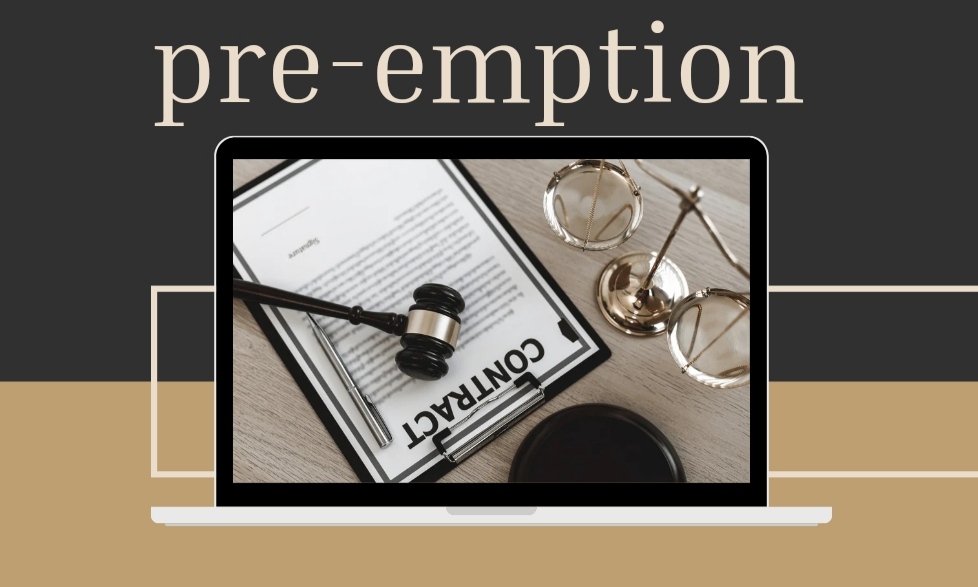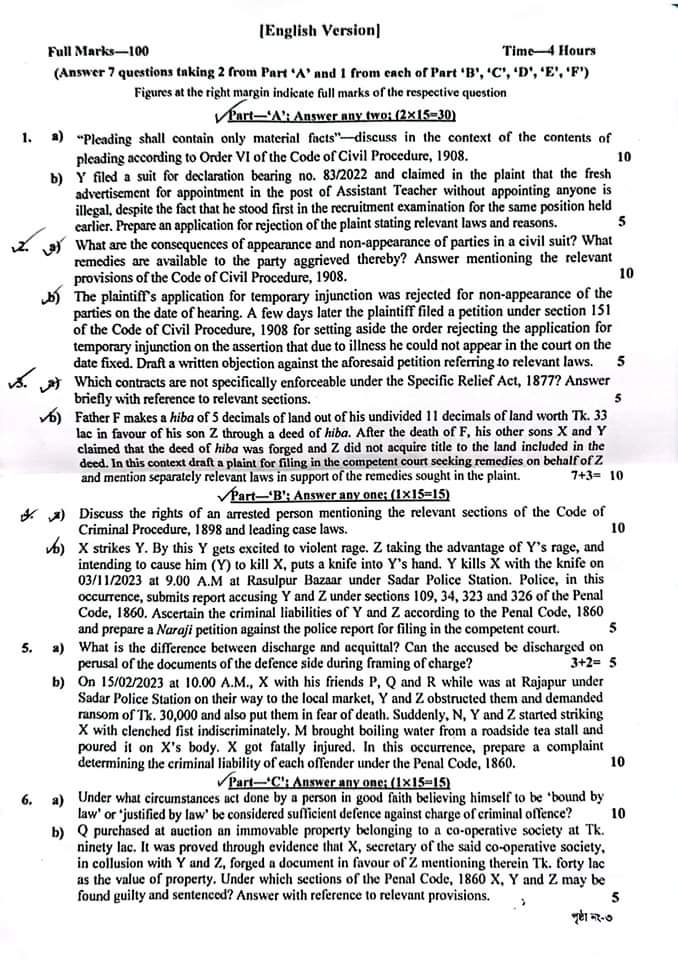A Short Note on Pre-emption in Muslim Law and Statutory Laws: Bangladesh Perspective
It was narrated that Jabir ® said: “The Messenger of Allah (ﷺ) said: 'Whoever has a date-palm tree or land, should not sell it until he has offered it to his partner.' ”
It was narrated from Ibn Abbas ® that the Prophet (ﷺ) said: “Whoever has land and wants to sell it, let him offer it to his neighbor.”
It was narrated from Jabir ® that the Messenger of Allah (ﷺ) said: “The neighbor has more right to preemption of his neighbor, so let him wait for him even if he is absent, if they share a path.”
Ahadis/Traditions
of Prophet of (SM) including the preceding ones are said to be the origin of
pre-emption law. Though, the pre-emption is originated from the Hadith of Prophet (SM), the rules of
pre-emption have later been included in different laws of Bangladesh. These
include the State Acquisition and Tenancy Act, 1950, the Non Agricultural
Tenancy Act, 1949 and the Land Reform ordinance, 1984. Pre-emption under Muslim
Law along with relevant provisions of above laws are going to elaborated in
this write-up.
Meaning of Pre-emption: The word pre-emption is interchangeable with Arabic term Sufa which means conjunction or which is adjacent. In other words, pre-emption means the prior right to purchase the property of others to whom he is either co-heirs or neighbor. Thus, right to pre-emption is the right to receive any transferred property on priority basis. In such cases, if the seller sells the land to an outsider without giving the news or notice of the sale to, firstly the co-sharers of the land, secondly the co-sharers of a right to way or water and thirdly, neighbor, the land can be re-purchased by the above pre-emptor through filing a pre-emption case in the court. Right to pre-emption is only arises when the sale is complete. Thus, the owner of an immovable property has the right to repurchase a neighbouring property sold to another party. Justice Mahmood describes in the case of Govind Dayal v. Inaytullah (1885)-
“pre-emption as, a right which the owner of certain immovable property possesses, as such, for the quiet enjoyment of that immovable property, to obtain, in substitution for the buyer, proprietary possession of certain other immovable property, not his own, on such terms as those on which such latter immovable property is sold to another person.”
Again, Black’s Law Dictionary defines-
“it
as right to set up a prior claim, or the right to gain an advantage before
anybody else.”
When pre-emption rights arise: Right of pre-emption is a right relating to immovable property. The co-partner's right of pre-emption arises when the immovable property is sold or transferred to a person who is not a co-sharer, including depositing the property. In this case, the right of the pre-emption claimant arises on the day the property is registered and the title is transferred. However, no right of pre-emption arises from donation, Chadaka, waqf, mirash, bequest or lease in perpetuity.
Who can claim pre-emption? Following three categories of persons can claim pre-emption under Muslim Law-
1. Co-sharer (Shafi Sharik): The co-sharers or joint-owners of a property can claim pre-emption.
2. Participator in Immunities (Shafi Khalit): Joint owner of easement right e.g., a common way attached to a property can also claim the right to pre-emption.
3. Neighbour (Shafi Jar): Again, neighbors or persons who are the owners of adjacent lands or buildings can claim this right to pre-emption.
The above claimants can demand pre-emption and will have priority over other on the chronological basis.
Procedure for claiming pre-emption: Following three demands are recognized as the procedure to claim pre-emption-
1. First Demand/Immediate Demand (Talab-i-Mousibat): In this stage, intention to purchase the property should be notified by the pre-emptor immediately after having knowledge of it.
2. Second Demand/Demand before witness (Talab-i-Mowasid): As the next step, the pre-emptor should make the demand to purchase the property in presence of witnesses.
3. Third Claim/Legal Claim of Ownership (Talab-i-Tamlik): As the final stage, the pre-emptor has to make the third demand by instituting a suit in a court of law in order to establish his claim legally.
Other Conditions include
1. In Muslim law it is not necessary to deposit money before filing a pre-emption case. In such cases, the money has to be deposited after the judgment of the case.
2. A suit of pre-emption under Muslim Law has to be filed in a civil court having pecuniary jurisdiction.
3. It has to be filed within 1 (one) year of the sale.
Pre-emption in Statutory Laws of Bangladesh: Beside the rules of pre-emption laid down by Muslim personal law, different statutory laws contain provisions relating to pre-emption which are going to be discussed below:
Pre-emption under the State
Acquisition and Tenancy Act, 1950: A case has to be filed
under section 96 of the State Acquisition and Tenancy Act, 1950 in case of
pre-emption of agricultural land. A
co-sharer tenant in the holding by inheritance can only bring the claim. Under present section, in order to file a
case, four types of money have to be deposited in the court otherwise the case
will be dismissed by the court. The
payment includes,
1. The value of the
land as mentioned in the Sub Kabla Deed/Sale Deed
2. Compensation at the
rate of 25% per annum on the said value
3. 8% annual simple
interest on the said value
4. The first purchaser shall direct the deposit of such other money as the Court may deem fit.
Other
conditions include-
1. 25% compensation and 8% interests have to be calculated from the date of registry of deeds to the time of filing the case.
2. In the case of sale of a residential house, there will be no pre-emption case.
3. The suit has to be filed within
4. According to section 89 of the State Acquisition and Tenancy Act, 1950, after 3 years from the date of land registry, no suit can be filed claiming pre-emption.
5. The suit should be filed in a court having pecuniary jurisdiction according to the value mentioned in the sub-payment deed of the land sold.
Pre-emption suit does not run, if
1. Sold land becomes
homestead,
2. The land sold is
handed over to the seller before the suit for foreclosure is filed,
3. The sale is
considered collusive or fraudulent,
4. Property is
transferred in terms of exchange or partition,
5. Husband transfers
property to wife or wife to husband by will or donation,
6. If heba-bil-ewaz is transferred to the
root,
7. Any gift or bequest
of three men related by blood conveys the original,
8. Waqf in Muslim law and transfers dedicated to religious or charitable purposes.
Pre-emption under the Non Agricultural Tenancy Act, 1949: Section 24 of the Non-Agricultural Tenancy Act, 1949 deals with right to pre-emption of non-agricultural land. The provisions of this section attract in case of land in a municipal area. Pre-emption in respect of non-agricultural land is only possible under section 24 of the Non-Agricultural Tenancy Act. Section 24 provides that a non-agricultural tenant is transferred, one or more co-sharer tenants of such land may, within four months of the service of notice issued and, in case no notice had been issued or served, then within four months from the date of knowledge of such transfer, apply to the court for such portion or share to be transferred to himself or to themselves, as the case may be. If the plaintiff in such cases does not deposit the sale price (deed value) along with 5 percent of the sale price (deed value) has to be paid as compensation to the court. Additionally, 6.25% interest also has to be calculated and submitted to the court while filing the suit of pre-emption in respect of non-agricultural land.
Pre-emption under the Land Reform Ordinance, 1984: Section 13 of the Land Reform Ordinance, 1984 gives the bargadar the right to Pre-emption in the barga property, which has been sold.
Appeal and Revision: There is scope of appeal against this order under law. Under section 96(12) of the State Acquisition and Tenancy Act, 1950, an appeal can be made against the order of the court in pre-emption cases. But no second appeal can be made against the judgment of that appeal. However, a revision can be filed under section 115 of the Code of Civil Procedure, 1908 against the decision of the first appeal.






